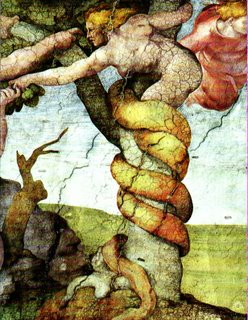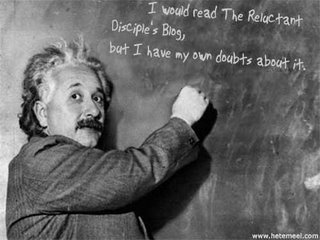 The Creation/Genesis Account
The Creation/Genesis AccountI have read a lot and listened to many debates about this issue and have to admit that I often walk away scratching my head. So many people hold so many different views and I don't doubt their sincerity or scholarship, but sometimes the final product is what ends up bothering me.
I grew up with the firm belief that God created the world exactly in the fashion laid out in Genesis 1-2. The interpretation of this passage was to be taken literally to understand that God created the Universe and all that is in it in a literal span of 6 24 hour days. I had no problem believing that. To me it made enough sense, but more than anything else it served as a concrete foundation for everything else that I believed to stand on. Now I am older. I don't want to be so arrogant as to think that my mind has matured to the point to thinking that believing the same way is somehow childish; but I do believe that much of my understanding of how to read Genesis has changed.
Earlier today I was listening to a discussion between a Reformed pastor and a former Church of Christ pastor-gone-atheist. The Reformed pastor is someone who is called a
presuppositionalist. In short, what that means is that when it comes to examining any kind of issue, the basic presupposition or starting place of reason is that the Bible [read in its literal form] is the basis and starting point by which all things should be examined. So this was the jist of the conversation- The Reformed pastor asked the ex-pastor what the initial step was to his "deconversion" from Christianity. The ex-pastor said that it all started when he began to study Genesis from a literal reading and compare it to science. He began to find that there were several ways in which science seemed to contradict what the Bible said happened. From there it was all just a downward spiral toward unbelief.
The Reformed pastor then explained to the ex-pastor why that was a dangerous thing to do; take the Bible out of the "figuring out" process. They talked a little bit about different theories behind how the world and universe came about. The Reformer seemed like he was absolutely set on filtering all external information through his literal interpretation of Genesis. Needless to say, neither party was totally convincing in their arguments.
So what do I believe? None of this is conclusive or exclusive and is primarily an argument from literature and philosophy, but I have spent about a year or two really studying and thinking about the issue and through my journey I have arrived at this view- I believe that the creation account laid out in Genesis is just a spiritual metaphor for-
1. Contrasting the Pagan ideas that the Creator was removed from his Creation by including God in the narritive as being actively involved in the creation of each part of the life system.
2. Showing the purpose of life being that of having a relationship with God.
3. Showing the interaction between God and his creation of Man and how Man failed the test.
4. Showing the effects of that failure and its consequential outworking throughout the rest of Creation.
Why do I believe this? Why don't I put as much stock anymore in to a literal reading of the account? For a number of reasons. This is in no way a comprehensive list, not do I intend to delve into all of the scientific and theological issues involved with it, but just kind of a thought progression of a studied "pew muffin" like myself.
I have several questions that come to mind when I read the text. The first question is this-
If God created the world in only 6 days, then what kind of time frame do we use to explain the amount of time that makes up a day? a. I know that there are many different explanations for this one. The most common explanation is to compare how the Hebrew word
yom [day] is used in other passages of Scripture. I don't know if this is really the best test though, because like in the English language, Hebrew can use one word in many different ways. There are many passages throughout the rest of the Bible that allude to the idea that God's perception/usage of time is much different than ours is; i.e. "
a day unto the Lord is as a thousand years."
b. The passage itself lends thought to the idea that God set things in motion, and then stuck around long enough to see if they would naturally continue to do what he told them to do; e.g. "
And God said, Let the earth bring forth grass, the herb yielding seed, [and] the fruit tree yielding fruit after his kind, whose seed [is] in itself, upon the earth: and it was so. And the earth brought forth grass, [and] herb yielding seed after his kind, and the tree yielding fruit, whose seed [was] in itself, after his kind: and God saw that [it was] good." So it looks like here that God gave the command, then stood back and watched and saw that it obeyed. That doesn't just happen usually in only 24 hours.
c. God didn't even make the sun and moon to govern the day and night until the "4th day."
Another question that comes up is-
If Adam and Eve were the first humans and they had children,
did they have them before or after the fall? a. If they had them
before the fall, then it is plausable to believe that they could have had tons and tons of children without them being genetically screwed up from what we have adopted to believe are the "effects of sin." However, the text tends to say that they didn't have any until
after the fall because that is how God said that Eve would be "saved"- through childbearing.
b. Since it tends to convey that they were born
after the fall not only does it leave out all of the other hundreds of children that they would have also had to have in order to "replenish" [KJV] the earth, but it also doesn't seem to be compatible with the idea of genetic mutation that is understood to have come about from the fall.
c. The use of the word "replenish" in the command that God gave to them in populating the earth. This is the same thing that he told Noah to do after the flood; so who was here before Adam and Eve? You cannot
replenish something if it didn't first have something else. He told them to replenish the earth which means that they were to once again fill a void that was caused by the absense of something else.
Another question I ran across was-
What did it mean that a suitable helper was not found for Adam? Many other sources that I have read say that God tried to find compatibility with Adam and many of the different animals but that companionshp that he made Adam to need couldn't be filled by any of them.
Another issue-
Are "Adam" and "Eve" names or symbols? We have come to believe that they are names, but in the Hebrew they are actually
titles. Adam isn't a person's name, but rather it is a word that means
man as in
mankind. And the word Eve means
from mankind. So is this talking about only two individuals, or a group of people, or a thing? I tend to believe that the picture here is that of
mankind being created and the "Eve" that was created was man's
ability to perform functions or actions that flowed out of himself. So how would the text read according to my observations?
"And God made a dwelling place for mankind. And God took mankind and breathed into him the breath of life. Then God said 'it is not good for man to be alone; so he put him into a deep sleep and drew out of him the ability to work. This would be his fulfillment or sense of purpose that God made for him."
So I don't see Adam and Eve as literal people who were the first people to be created, but rather a symbol of the human race in whatever form it existed, in whatever way it was made by God.
The Fall
There are some issues that come into play with the Fall that are also interesting to note that make it difficult to read this account as an actual literal event that happened. Let's talk about them.
The Tree of the Knowledge of Good and Evil- Most of the time we are taught that Adam and Eve sinned by disobeying God in that they ate from the tree. That may be so, but what I am more interested in is
what kind of tree it was. It wasn't just a tree, but a tree of the
knowledge of good and evil. So it wasn't that God didn't want them to eat of the tree, but he didn't want them to eat and gain the knowledge of what good and evil was. This is re-iterated later on in Genesis 3 when God makes the decision to ban them from "the garden" when he says "
now they have become like us in that they know good and evil." It wasn't that they ate, but rather now the knowledge that they possessed from eating it.
The Serpent- The narritive says that the serpent was more cunning than any of the other beasts of the field. This serpent not only had the ability to talk, but he apparently also probably walked either upright or was amphibious in nature. First he talks to the Woman. She then argues with him and misconstrues God's words to her by adding to the story. She then talks the Man into "sinning" with her. Then they are both cursed and then the serpent is cursed also to now go about on his belly and eat the dust of the earth. Then God told him that there would forever be friction between the Serpent's offspring and Man's offspring. So this serpent also supposedly had physical consequences for tempting the man and the woman.
If the Serpent in question here is Satan, it is interesting to note that the Hebrew word for Satan is
haSatan. This word simply means, the adversary or the opposer. There are so many numerous places throughout the rest of the Bible where Mankind, or the whole Human Race is also called the "enemy of God." Ephesians even states that we were "
enemies of God in our minds." So was there a real talking snake in the garden? I tend to think not. The
only other place throughout all the rest of the Bible where an animal speaks is when Baalam's donkey speaks; and that only seems to be because no one else was around.
I tend to see the temptation of the snake in Genesis to be a picture of how Mankind was created in the image of God. God put within man, and pulled out of man [Eve- out of man] the ability to work and produce. In his work and produce though he was tempted by his own opposition to follow after the "
lust of the eyes, the lust of the flesh, and the pride of life." He saw that the pursuit to be like God in knowing or judging for himself what was good or evil could try to somehow replace his need for his Maker. This was later done all over again at the Tower of Babel. James says that "
when a man is tempted he is drawn away and enticed by his own lust." So the snake is just the picture of how easily a man can get into trouble when he lets his work get the best of him. This is ultimately sin before God; that the whole human race has replaced the need for God by their work and desire to be as God.
The Expulsion From The Garden-
After the Fall, God convenes with the rest of the Trinity and they decide that they don't want Mankind to remain in the Garden in this illuminated state "
lest they eat from the tree of life and live forever." Now, He had already told them that if they ate from the tree that they would die [Heb. "in dying you will die"] so what does this mean that they could now live forever? Is it a contradiction? I don't think so. I think that it is another picture of God's intent to ban them from the idea of perfection. They had become like him [in abstract theory] and he would not compete with them. Now, even though he bans them from the Garden and will not allow them to return he takes the next step to cover them with protection. He makes clothes for them after they see their nakedness. He provides another land for them to live in. He treats them well. Then he gives the curses also in that Mankind would now suffer pain in his work, and that Womankind would be saved in childbearing.
Then they have kids. Cain kills Abel. Cain gets banished out of the land of his father and becomes a nomad but yet finds himself a wife in a distant land. Where did she come from? Who else was there on the earth scattered around in various locations already? Did the authors of Genesis leave that out?
I do not take Genesis to be the literal explanation as to how the world began. In light of all the other parts of the rest of the Scripture, I understand Genesis to be the symbolic explanation of how the progression of man lead up to the birth of the nation of Israel.
It is not my attempt to use this as a means to poke fun of those to take a literal view of these "beginning things" but rather to just try and look at them from another perspective. I do not believe that it is damaging to take these things and read them from a literal perspective, but I personally find that they have so much more meaning when put into the poetic literary context in which they were written. Jesus always seemed to be about looking beyond what was clearly seen by the naked eye to see the mystery that was hidden underneath.
In closing- I greatly disagree with the Pastor who thinks that leaving behind a fundamentalist understanding of the Scriptures is just heading for trouble. That may be what he needs for his own journey of faith; but I am not alone when I say that the road of this spiritual walk indeed has been paved by those who can see beyond the paint and the canvas to see the picture that the artist intended to paint.










